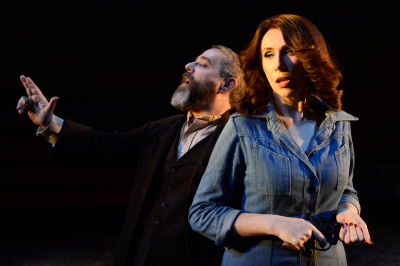Assassins at the Menier Chocolate Factory surprised me. It surprised me in ways and areas I didn’t think it would, and that makes for a fairly big surprise. As it’s Sondheim, the scent of the unexpected is part of the deal: let’s take the people who assassinated – or attempted to assassinate – presidents of the United States, and make a musical about them, and it will have an episodic structure, and the stories will jump forward and backward and blend and come apart, and it will make perfect sense and it will be amazing. So far, so good and so true.
The thing that surprised me the most in the production directed by Jamie Lloyd is how political it was. Did it play like that 12 years ago at the Donmar? (correction: it’s 22 years as the Donmar production was 1992! where does time go?). The story is about misfits, people left behind and isolated, people who try to find their way back and instead find a back alley to hell. If, twelve years ago, this was empathy for people we probably never meet, today it feels closer to home. The betrayals are personal and the context social. Towards the end, Stewart Clarke’s Giuseppe speaks italian, and David Roberts’ Czolgosz is obviously and primarily a poor polish worker looking for a better life. It’s hard not to think of immigration dreams – american or otherwise – imploding.
The structure of the piece works as if time has collapsed and the stories start to link again by free association. But the links are strong and get stronger, and they function like a noose, smaller and tighter. Continue reading








